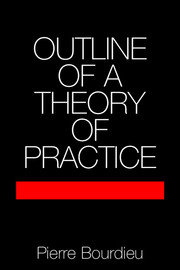4 - STRUCTURES, HABITUS, POWER: BASIS FOR A THEORY OF SYMBOLIC POWER
Published online by Cambridge University Press: 05 March 2013
Summary
Doxa, orthodoxy, heterodoxy
There is, perhaps, no better way of making felt the real function of classificatory systems than to evoke as concretely as possible the abrupt and total transformation of daily life which occurs on “the return of azal”. Everything, without exception, in the activities of the men, the women, and the children, is abruptly altered by the adoption of a new rhythm: the movements of the flock, of course, but also the men's work and the domestic activities of the women, the place where the cooking is done, the rest periods, the food eaten, the times and the itinerary of the women's movements and outdoor work, the rhythm of the men's assembly meetings, of the ceremonies, prayers, markets, and meetings outside the village.
In the wet season, in the morning, before eddoḥa, all the men are in the village; with the exception of the meeting sometimes held on a Friday after collective prayer, this is the time of day for meetings of the clan assembly and all the conciliation committees (before a divorce, or to prevent a divorce, before division of an estate or to avoid division); this is also the time when announcements concerning all the men are made from the top of the minaret (summoning them to participate in collective work, repairing roads, digging drains, transporting flagstones, etc.).
Information
- Type
- Chapter
- Information
- Outline of a Theory of Practice , pp. 159 - 197Publisher: Cambridge University PressPrint publication year: 1977
Accessibility standard: Unknown
Why this information is here
This section outlines the accessibility features of this content - including support for screen readers, full keyboard navigation and high-contrast display options. This may not be relevant for you.Accessibility Information
- 18
- Cited by
